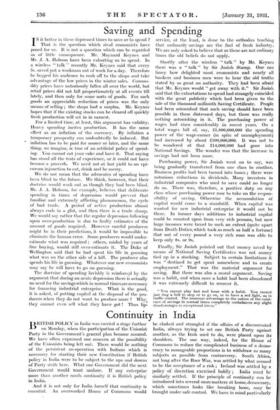Saving and Spending
IS it better in these depressed times to save or to spend ? That is the question which rival economists have posed for us. It is not a question which can be regarded as of little consequence. Mr. Maynard Keynes and Mr. J. A. Hobson have been exhorting us to spend. In a wireless " talk " recently Mr. Keynes said that every 5s. saved put a workman out of work for a day. Therefore he begged his audience to rush off to the shops and take advantage of the low prices in the winter sales. Commo- dity prices have notoriously fallen all over the world, but retail prices did not fall proportionately at all events till lately, and then only for some sorts of goods. For such goods an appreciable reduction of prices was the only means of selling ; the shops had a surplus. Mr. Keynes hopes that if the existing stocks can be cleared off quickly fresh production will set in in earnest.
For a limited time, at least, this argument has validity. Heavy spending incites production. It has the same effect as an inflation of the currency. By inflation a temporary prosperity can undoubtedly be induced. But inflation has to be paid for sooner or later, and the same thing, we imagine, is true of an artificial policy of spend- ing. You cannot eat your cake and have it. That saying has stood all the tests of experience, or it could not have become a proverb. We need not at last yield to an epi- curean injunction to cat, drink and be merry.
We do not mean that the advocates of spending have been blind to the future. We think, however, that their doctrine would work out as though they had been blind. Mr. J. A. Hobson, for example, believes that deliberate spending in times of depression would prevent that familiar and extremely afflicting phenomenon, the cycle of bad trade. A period of active production almost always ends in a glut, and then there is a trade slump. We would say rather that the regular depression following upon over-production is due to faulty estimates of the amount of goods required. However careful producers might be in their predictions, it would be impossible to eliminate the human error. Some producers would under- estimate what was required ; others, misled by years of free buying, would still over-estimate it. The Duke of Wellington said that he had spent his life in guessing what was on the other side of a hill. The producer also spends his life in guessing. Whatever our new economists may say he will have to go on guessing.
The doctrine of spending lavishly is reinforced by the argument that during an acute depression there is actually no need for the savings which in normal times arenecessary for financing industrial enterprise. What is the good, it is asked, of putting capital at the disposal of the pro- ducers when they do not want to produce more ? Why, they cannot even sell what they have got ! Thus lip- service, at the least, is done to the orthodox teaching that ordinarily savings are the fuel of fresh industry. We are only asked to believe that as these arc not ordinary times the old beliefs do not apply.
Shortly after the wireless " talk " by Mr. Keynes there was a " talk " by Sir Josiah Stamp. One can fancy how delighted most economists and nearly all bankers and business men were to hear the old truths stated by so great an authority. They had been afraid that Mr. Keynes would " get away with it." Sir Josiah said that the exhortations to spend had strangely coincided with the great publicity which had been given to the sale of the thousand millionth Saving Certificate. People had been astonished that such saving should have been possible in these distressed days, but there was really nothing astonishing in it.' The purchasing power of wages had risen considerably .in recent years. On a total wages bill of, say, £1,800,000,000 the spending power of the wage-earner (in spite of unemployment) had increased by about £100,000,000. It was not to be wondered at that £14,000,000 had gone into National Savings. The wonder was that the increase in savings had not been more.
Purchasing power, Sir Josiah went on to say, was being gradually transferred from one class to another. Business profits had been turned into losses ; there were notorious reductions in dividends. Many investors in industrial companies who used to save could no longer do so. There was, therefore, a positive duty on any class whose purchasing power rose to take on the respon- sibility of saving. Otherwise the accumulation of capital would come to a standstill. When capital was wanted for new industrial enterprise it would not be there. In former days additions to industrial capital could be counted upon from very rich persons, but now large incomes were taxed to such an extent (quite apart from Death Duties, which took as much as half a fortune) that out of every pound a very rich man was able to keep only 8s. or 9s.
Finally, Sir Josiah pointed out that money saved by means of National Saving Certificates was not money tied up in a stocking. Subject to certain limitations it was " destined to get spent somewhere and to create employment." That was the material argument for saving. But there was also a moral argument. Saving was a habit, and when once a habit had been abandoned it was extremely difficult to recover it.
" You cannot play fast and loose with a habit. You cannot just ring a bell to stop or to go on, or to have a red light, as in traffic control. The immense advantage to the nation of the exist- ence of savings in normal times completely outbalances any alight disadvantages in exceptional times."






































 Previous page
Previous page